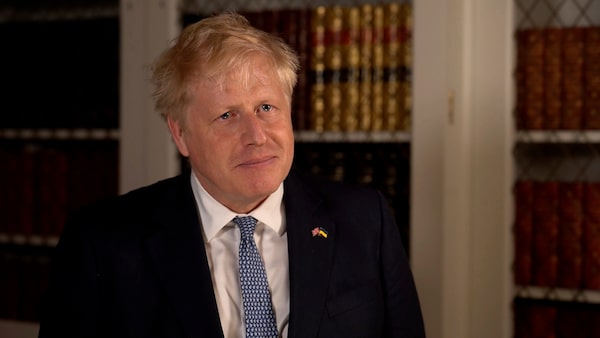
U.K. Prime Minister Boris Johnson speaks after surviving an attempt by Tory MPs to oust him as party leader following a confidence vote in his leadership, June 6, in London.PA/The Associated Press
Boris Johnson, a man whose political career has often consisted of unlikely last-minute escapes from disasters of his own making, faced his most challenging test on Monday night, as his own MPs held a late-night vote of confidence over his admitted law-breaking and ethical lapses springing from his lockdown-era parties.
He survived the vote by 211 to 148, meaning he will return to 10 Downing St. on Tuesday knowing that only 59 per cent of his 359 MPs have confidence in him – and, given that more than 160 of those MPs are ministers and parliamentary secretaries, and therefore contractually required to support him, he will know that his political world is closing in on him.
That might seem like a familiar state of affairs for the perpetually disheveled former newspaper columnist, whose career since becoming Prime Minister in 2019 has often consisted of unlikely self-rescues. But this time, even many of the MPs who voted for him to remain admitted they see little future for him.
“I mean, we don’t have an alternative,” MP Kwasi Kwarteng, who serves as Secretary of State for Business in Mr. Johnson’s cabinet, said in a radio interview. “I think the idea that we spend three months or whatever it might be finding a new leader and all that, going through all of that beauty contest, is absurd.”
Mr. Johnson is far from the first sitting British prime minister to face a confidence vote from within his party – it happened to Tories Theresa May, John Major and Margaret Thatcher. The last Conservative leader to lose such a vote was Iain Duncan Smith in 2003, although most of the others resigned shortly after their confidence votes.
Mr. Johnson survived on Monday night by a smaller margin than Ms. May or Ms. Thatcher had. And, unlike them, he has an indelible record of having broken the law and his own party’s rules of conduct, making him extremely vulnerable to an electorate that may have turned against his Brexit path and other policies.
“I think Boris will win technically, but I think it will be a psychological defeat,” said Tory MP David Davis, a former Brexit secretary. “We may end up with a sort of paralyzed government or a populist government, where everything they do is just designed to curry favour with one sector of the population or another, and that’s quite dangerous. That’s where governments go wrong.”
Boris Johnson’s bungling goes far beyond a Christmas party
Boris Johnson’s clown car is headed for a ditch
Mr. Johnson’s fateful moment began on the weekend, as he stood before TV cameras watching the Platinum Jubilee celebrations for the Queen. He received a call from Graham Brady, the chairman of the 1922 Committee, which represents the Tory party’s backbenchers. The committee had received the required quorum votes necessary to trigger an internal vote of non-confidence, he said, as Mr. Johnson struggled to keep a smile on his face.
Ostensibly, the vote was about parties. During the pre-vaccination months between April, 2020, and the spring of 2021, when his government had banned all gatherings under national lockdowns and many Britons were thus forced to miss the funerals of loved ones, Mr. Johnson and his staff held as many as 12 alcohol-fuelled parties, at least three attended by Mr. Johnson himself – including a birthday party for him during the deadliest period of the 2020 pandemic.
At first, Mr. Johnson denied parties had occurred, then claimed they were meetings, and then that he had not personally attended them. Explosive video evidence eventually contradicted all those claims.
Investigations by the government’s Cabinet Office determined he’d breeched the Ministerial Code of Conduct, which suggests he would have to resign if he had broken the law. The Metropolitan Police found that he had indeed broken his own law and issued him a penalty notice.
He responded by altering the Ministerial Code of Conduct, removing the language suggesting he would have to resign. Many MPs, including some loyal supporters, said it was untenable to have a Prime Minister who had knowingly broken the law and engaged in what many saw as corrupt and deeply unethical practices.
Beyond this, however, was a sense among the Tory rebels that Mr. Johnson could not survive an election after a string of failures. His proudly championed exit from the European Union has led to crises in food and medical supplies, empty shelves and travel catastrophes. His deal to have refugee claimants shipped to Rwanda has outraged moderates for its shocking ethics and fiscal conservatives for its high cost.
What he reportedly offered his MPs in his closed-door defence speech on Monday night was more tax cuts and deregulation – the sort of right-wing wallpaper that is unlikely to inspire them on the campaign trail as they struggle to avoid mentioning a party leader that almost half of them have told to leave.
Keep your Opinions sharp and informed. Get the Opinion newsletter. Sign up today.